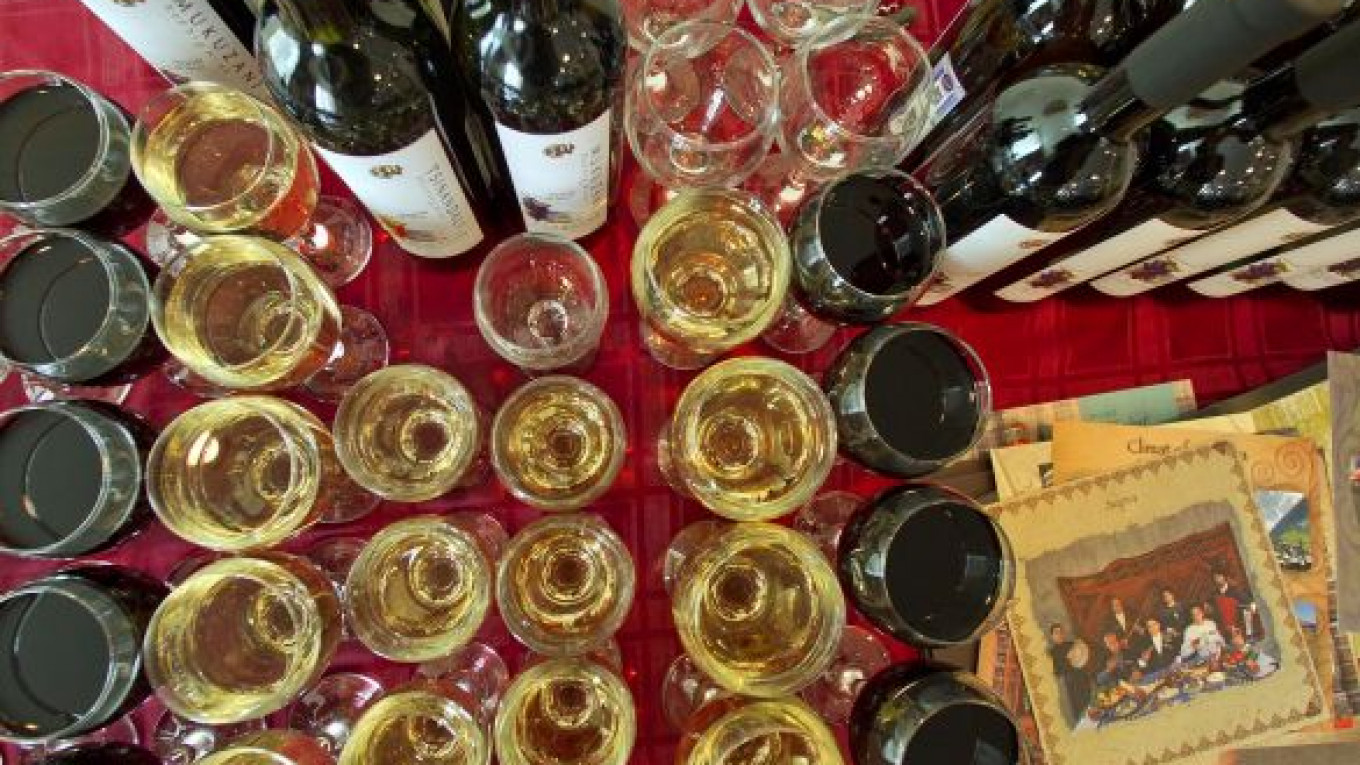It was meant to be a triumphant comeback that would patch up sour diplomatic relations between former Soviet republics and satisfy Russia's thirst for quality wine. But following a six-year ban from the country, Georgian wines are facing an uphill battle in the market and experts say they are unlikely to regain their former glory.
"Georgian wines had 10 percent of the market before the ban. Now they won't get more than 2 percent," said wine industry expert Erkin Tuzmukhamedov. "The niche has been filled by cheaper wines from Spain, Portugal, Latin America."
The Federal Consumer Protection Service banned imports of Georgian wine in 2006, claiming that six out of 10 didn't meet quality standards, though critics speculated that the move was politically motivated in light of the escalating tensions between the former allies.
A large portion of the wines that were then found to be of bad quality were actually counterfeits produced in Russia, according to wine producers and wine experts. ?
Russia's chief sanitary inspector Gennady Onishchenko gave 65 Georgian companies permission to bring their products into the country starting at the end of June — a decision that was partially stimulated by Russia's accession to the World Trade Organization last summer.
Georgia exported about 60 million bottles of wine annually before the embargo, 50 million of which went to Russia.
The ban left winemakers in a difficult financial situation, though they were eventually able to introduce their products into a number of European and Asian markets. Producers took steps to modernize their production cycles, which sommeliers said has led to big improvements in flavor.
"The years after the embargo were difficult. I'll tell you honestly, it was hard. But when it's hard you also get a second wind," said Zurab Chkhaidze, general director of Kakhetian Traditional Winemaking. "Georgian wine, and the spirits industry as a whole came alive and found new energy."
Chkhaidze's company was one of the first to send Georgian libations to Russia after the embargo was lifted. Its first 200,000 bottles are about to appear on the shelves, while his company anticipates a total export volume of 1.5 million bottles of wine and 2 million bottles of cognac in its first year back on the market.
Now that Georgian-made alcoholic beverages are returning to their former stronghold, consumers will get a chance to make their own quality judgement, albeit at higher prices than they might remember.
Before 2006, most bottles of Georgian table wine cost 150 to 200 rubles ($4.6 to $6). The new wave of wine flowing north has three price categories: 250-350 rubles, 600-800 rubles, and collectable wines priced for those with no budget limitations.
Dmitry Kovalenko, sommelier at Gavroche wine bar, said he expected the middle category to be the most popular with Russian consumers, but in that range the wines will face stiff competition from new world vintners, such as Chile, South Africa and Argentina.
Wines from long-established wine regions, however, are unlikely to pose a challenge to Georgian producers because they are pricier, Kovalenko said. Analogous wines from Italy, for example, start at 1,000 rubles. French wines are even more expensive.
Despite the competition they will face finding their spot on Russian wine lovers' palates, Georgian producers are optimistic and plan to export 10 million bottles of wine by the end of 2013 and double that amount the following year.
Generations of Russians that reached adulthood in the Soviet Union and inhabitants of the North Caucasus are considered to be the core markets for Georgian wine. The success of producers' plans will depend largely on how loyal these consumers prove to be.? ?
"The older generation isn't going anywhere," Kovalenko said. "These are people who were raised on this wine, and they will continue to drink it."
Contact the author at [email protected]
A Message from The Moscow Times:
Dear readers,
We are facing unprecedented challenges. Russia's Prosecutor General's Office has designated The Moscow Times as an "undesirable" organization, criminalizing our work and putting our staff at risk of prosecution. This follows our earlier unjust labeling as a "foreign agent."
These actions are direct attempts to silence independent journalism in Russia. The authorities claim our work "discredits the decisions of the Russian leadership." We see things differently: we strive to provide accurate, unbiased reporting on Russia.
We, the journalists of The Moscow Times, refuse to be silenced. But to continue our work, we need your help.
Your support, no matter how small, makes a world of difference. If you can, please support us monthly starting from just $2. It's quick to set up, and every contribution makes a significant impact.
By supporting The Moscow Times, you're defending open, independent journalism in the face of repression. Thank you for standing with us.
Remind me later.


